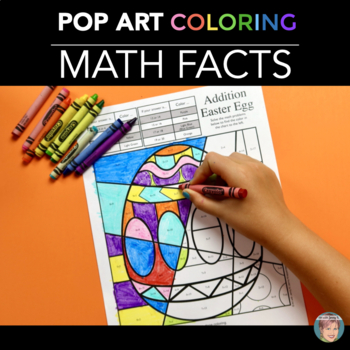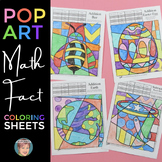Easter Math Activity | Easter-themed Math Fact Coloring Pages
- PDF
What educators are saying
Also included in
- Art Projects: Art Activities for the entire year BUNDLE for classroom teachers and art teachers for all seasons and holidays. They are designed for grades 2-8. There is math, writing, social studies, collaboration, and art all combined to make life as easy for teachers as possible while allowing chiPrice $129.99Original Price $186.94Save $56.95
- This can't miss Pop Art Math Fact Review Coloring Sheets BUNDLE includes sets for all major holidays. Use these unique printable coloring pages in your classroom ALL YEAR LONG to review addition, subtraction, multiplication, and division. They are great as morning work, holiday activities, math centPrice $29.99Original Price $54.90Save $24.91
Description
Easter-themed math fact coloring sheets. These fun Pop Art style MATH FACT coloring sheets feature addition, subtraction, multiplication, and division practice. They provide a review for addition up to 20, subtraction from as high as 25, and all the 2s-9s times tables in the multiplication and division sheets.
This Easter math resource is part of the Math Fact Pop Art Coloring Sheet Bundle for the entire year (10 sets included).
Combine math with art for a win-win, a great Easter math activity!
Art integration is one of the most effective ways to engage students. I have created this product using my popular “pop art” images. You will find that I have filled each Easter image with patterns and then added math problems into the various shapes and patterns. There are a LOT of math problems on each sheet.
Instead of creating 2 separate products to break up the addition/subtraction and multiplication/division, I’ve included them ALL in this one product at the same price as an individual set. There is something in this set for everyone!
These math sheets are great to give you an opportunity to create something beautiful for Easter but still let the kids practice their math.
This activity is also great for “discreet” differentiation. As the teacher, you know which students need a challenge and can do the division sheets and which students might still be struggling with subtraction. You can give out these summer math sheets, and all kids can work on their level.
I have also included writing prompts so when students finish early, they can write about Easter...and in my fashion, I also had to include one of my signature interactive coloring sheets in case you’ve never used them with your students.
I loved using these sheets in my classroom, and I can't wait for you to as well!
Other Easter resources are HERE.
If you like these Easter math sheets, I also have them in other holiday themes as well:
- Spring Math
- Earth Day Math
- End of the Year-Summer Pop Art Math coloring sheets
- Back To School Math
- Halloween Math
- Thanksgiving Math
- Winter, Holiday, Christmas Math
- Valentine's Day math
- St. Patrick's Day Math
I hope your students enjoy this project!
Please click the "Follow Me" button on this page to keep updated on all my new offerings!
Thank you for supporting my work and infusing your classroom with art!
Jenny K.
Let's Connect
FREE eBOOK: The Benefits of Directed Drawing for Kids
Sign up HERE to join my email list, and I'll send you a copy of my free eBook, The Benefits of Directed Drawing. Not to mention, after you join, you'll be invited to enjoy my "Subscribers Library" of freebies.
TERMS OF USE:
The purchase of this product is for one license and is for PERSONAL USE ONLY.
©Copyright 2015 Art with Jenny K.® ALL RIGHTS RESERVED. Permission is granted to copy pages specifically designed for student or teacher use by the original purchaser or licensee. The reproduction of any part of this product is strictly prohibited. Copying any part of this product and/or placing it on the internet in any form (even a personal/classroom website) is strictly forbidden. Doing so violates the Digital Millennium Copyright Act (DMCA).
If you like my work, please help me keep the price low by purchasing additional licenses for any teacher with whom you would like to share this lesson. Extra licenses are discounted.







